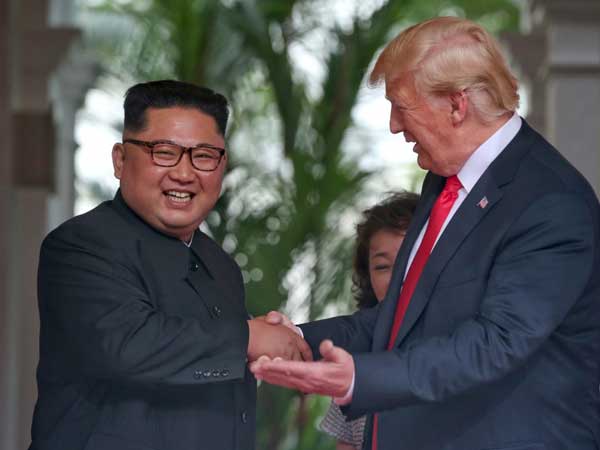
AS A past president of the Pugwash Conferences on Science and World Affairs, I am extremely happy that the US president Donald Trump and North Korean Leader Kim Jong-un have agreed to ensure the abolition of the development and testing of nuclear weapons. This is an important milestone in the movement for a nuclear weapon free world.
The Nobel Peace Prize 1995 was awarded jointly to Joseph Rotblat and Pugwash Conferences on Science and World Affairs “for their efforts to diminish the part played by nuclear arms in international politics and, in the longer run, to eliminate such arms”.
I hope this historic agreement will stimulate the countries which have not yet signed the nuclear non-proliferation treaty to endorse the treaty without further delay. We are thus in a position to follow the advice of Bertrand Russell and Albert Einstein who had made the following statement
“There lies before us, if we choose, continual progress in happiness, knowledge and wisdom. Shall we, instead, choose death, because we cannot forget our quarrels? We appeal, as human beings, to human beings: Remember your humanity, and forget the rest. If you can do so, the way lies open to a new Paradise; if you cannot, there lies before you the risk of universal death”
June 12, 2018, will go in the history of human kind as an important day for global peace and harmony.
The most urgent task today in agriculture is the need for increasing the income of small producers. This will be possible if they are able to get suitable income from rice biomass such as straw, husk, leaves and root. The Rice BioPark provides a glimpse into the untapped opportunities available for preparing value added products from the rice biomass. I do hope that the Rice BioPark established by the MS Swaminathan Research Foundation at Nay Pyi Taw with support from the Government of India and Myanmar will be the flagship of a new movement for maximising income from rice farming systems. Paddy and prosperity can then go together.
There are urgent tasks which need additional financial support and any peace dividend coming from the total nuclear disarmament should be utilised to support the sustainable development goal 2 aimed at the elimination of poverty and hunger. This goal calls for “end hunger, achieve food security and improved nutrition and promote sustainable agriculture”.
There are large areas of research and extension which needs support from the point of view of hunger elimination and poverty alleviation. It is to be hoped that the Trump and Kim initiative will be followed by other nations in reducing the expenditure on the development of new arms. Right now, a very large proportion of the budget of many nations goes to what is described as defence. What we need is attention to child and women malnutrition. After the end of the Soviet Union and the destruction of the Berlin Wall there was a lot of hope that there could be a peace dividend enabling nations to divert funds from defence to development. I chaired an International Commission on Peace and Food and a report has been published under the titled “Uncommon Opportunities : An Agenda for Peace and Equitable Development” (1994; ZED Books, London and New Jersey). Our hope did not materialise because of conflicts in several areas, including Korea. We hope this time there will be a genuine peace dividend and both USA and North Korea should take the lead in demonstrating what can be done with the money saved from the testing and development of nuclear weapons. The following are few examples:
Peace dividend: A detailed plan should be drawn up by the Security Council for a further 50 per cent reduction in global defence spending before the end of the decade. In addition, all states should conduct studies of the opportunities to re-deploy resources — manpower, educational, scientific and technological, productive and organisational — controlled by the military to combat rural and urban poverty as well as national and global environmental degradation.
Nuclear weapons : The use of nuclear weapons should be declared by the UN a crime against humanity. Based on the precedent of the Chemical Weapons Treaty, the proposal for a universal ban on the possession of nuclear weapons by any nation should be placed before the Security Council. The five permanent members should agree to the suspension of their veto power on this issue so crucial to the future of humanity.
Full employment : Partial or incremental measures will not solve the growing problem of unemployment. A radical change in values, priorities and policies — a structural adjustment — is required, based on the recognition that employment is a fundamental right of every human being.
Comprehensive strategies coordinated among OECD countries should be implemented to increase public investment to spur economic growth, remove tax disincentives for job creation and the bias towards development of capital intensive technologies, promote small firms, raise minimum educational and training standards, reorient social security programmes, increase labour market flexibility, and make income distribution more equitable.
Health for all should be an important goal since every child, woman and man born in our planet should have an opportunity for a productive and meaningful life.
(The writeris an agricultural scientist who led India’s Green Revolution)




